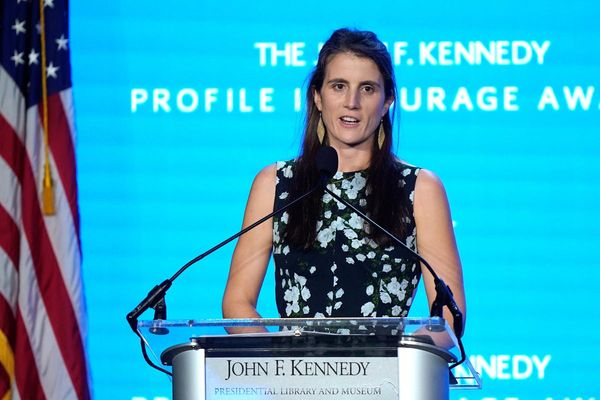
One year ago this week, Labor introduced its social media ban for under 16s, ramming it through parliament within seven days. Passing on the final sitting day of 2024, the contentious bill controversially only received a four-hour inquiry, such was the keenness of both major parties to speed it through parliament.
A year later, just 19 days before the laws come into effect on 10 December, the government was still adding new platforms to the list of tech companies to face up to $50m fines if they fail to ban children from their services.
Efforts to address online bullying, mental health concerns and the impacts of social media access on developing minds are worthy and noble, and the legislation still enjoys bipartisan support from Anthony Albanese and Sussan Ley down.
But big tech companies ensnared in the ban – YouTube, TikTok, Snapchat, X and more – are still rushing to confirm systems for age verification and how to communicate this to users, as well as ensure no interruption to users over 16.
And despite Albanese’s own personal endorsement of the scheme, there is a growing sentiment inside the government that there will be teething problems before and after 10 December; a creeping acknowledgment that, as Meta – owner of Facebook and Instagram – warned last week, there may be problems.
“Meta expects there will be a margin of error both above and below when attempting to estimate age,” the company said.
Translation: some children might slip through the net, while some over-16s might be mistakenly caught up.
Sign up: AU Breaking News email
If Meta, the biggest and richest social media company in the world, still anticipates problems after a year of preparation, then what could the smaller platforms – some only more recently confirmed in the scheme – be expecting?
Upon Friday’s addition of the streaming platform Twitch (owned by Amazon) to the ban, with just 19 days’ notice, the shadow communications minister, Melissa McIntosh, called it “a last-minute scramble”.
Axel Bruns, a professor in the Digital Media Research Centre at Queensland University of Technology, worries that parts of the scheme will be “unworkable”.
“Age verification technology doesn’t exist in the way the government wants it to exist,” he said.
Meta’s statement warned of “known shortcomings and significant margin in error in estimating age at the globally novel 16 age boundary”. Government sources downplayed such concerns, with a belief those warnings were mostly expectation management from big tech.
But at least one other major social media platform privately has similar reservations about how its systems will cope with the age-16 cutoff, with quiet concerns about complaints from wrongly banned adults on 10 December.
The communications minister, Anika Wells – promoted into the role after the May election, having to take up the complicated reform passed by predecessor Michelle Rowland – concedes “we aren’t chasing perfection”, setting the bar at making “a meaningful difference, because it is too important here not to try”.
The government stresses the onus is on platforms to set up systems to satisfy the laws, and that tech companies must have dispute mechanisms for adults who will inevitably be caught up.
The concerns raised by tech companies and experts have been brushed aside by government, receiving relatively little attention in many media outlets. A poll ahead of the bill’s November 2024 passage found the under-16s ban had 77% support among Australians, and remains popular for parents, as well as mainstream media, newspapers and radio stations which barracked for it.
Albanese himself has taken public ownership of the issue alongside Wells, regularly spruiking the parent-friendly reform in media appearances; there is no chance of the government backing down.
But the popularity of the concept – which exploded on to the federal political scene when pushed by former Liberal leader Peter Dutton – is wavering in the Coalition. McIntosh lashed the updates coming at “10 seconds to midnight”, claiming the list should have been finalised some time ago.
It’s not an unreasonable argument, particularly with the government’s messaging conceding that the laws won’t be perfect, but that parents will be able to set rules in the family home for their kids that social media is off-limits.
Meta has not yet specified exactly what technology it will use, or what users will have to provide, when the ban comes into force. Others have not told users what’s coming – perhaps a hint of the last-minute work still being completed.
Reddit told us they had nothing to share yet, Kick said they’d have more to say soon, and Snap said information was not far off. Other platforms had nothing to share publicly when we asked.
Bruns warned facial-scanning technology, as evidenced by the government’s age assurance trial, would make errors.
“There’s no technology out there that does what the government wants it to do,” he said, noting the technology’s well-known accuracy issues for older people, non-Caucasian users and female-presenting people.
Bruns also queried the seemingly broad definition of “social media” included in the ban, querying why it excluded problematic sites like 4chan but captured message board Reddit and video streaming sites.
During the final Senate debate on the laws in November 2024, the Greens senator Sarah Hanson-Young was livid it was being “railroaded and rushed through the parliament” in the shadow of the end of the year.
“Talk about putting out the rubbish,” she said.
The laws come into effect after parliament has risen for the year, and as Australia looks toward summer holidays. The government may be quietly happy that any teething issue, if they arise, will play out over the Christmas break.







